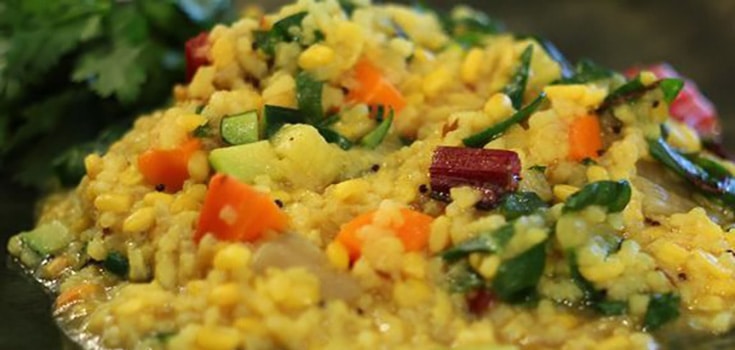Kitchari: Discover an Ancient Ayurvedic Meal Used for Healing

It’s called kitchari (kich-a-ree), and it’s a recipe still used by India’s centuries-old Ayurveda medicine for creating what we in the west could call homeostasis. But it’s different.
Ayurveda medicine is based on a principle of compositional elements called doshas. We are all composed of three doshas, Vada (air and ether), Pitta (fire or heat), and Kapha (earth and water). Usually one or two are predominant, but all three doshas are in everyone.
An Ayurveda practitioner is able to determine your predominant dosha or doshas in their proper order from physical examination and written questionnaire.
The doshas manifest both physiologically and psychologically. When they’re out of balance, our health suffers and we don’t act the way we should.
Ayurveda offers treatments, herbs, and dietary guidance to properly align your doshas. There is one DIY (do-it-yourself) dish you can prepare for a few days at a time to balance your doshas when you’re “out of sorts”. It’s called kitchari.
In Ayurveda, good digestion is the root of good health. A kitchari-only fast for a few days provides a mono-diet to align your digestive enzymes without confusing your enzyme production for awhile. The herbs help ignite what Ayurveda calls the digestive fire.
An easy to make and eat kitchari fast balances your doshas. One batch will last for a few meals. And you can spice it up with a healthy chutney of your choice on the side. Here’s one chutney recipe that uses mercury-detoxing cilantro.
A Basic Kitchari Recipe
Try to use white Indian basmati rice, which is usually parboiled. Parboiling is a method of extracting white rice while sealing in most of the nutrients of whole grain rice with the benefit of easier digestion.
Indian food markets sell it in large bags. But if you can’t get to an Indian store, buy bulk organic white basmati rice from a health food store, then buy some organic bulk mung beans to help purify the blood.
Ingredients
Here are ingredients you can use to prepare kitchari.
- 1 cup basmati rice
- ½ cup organic whole or split mung beans (bulk section of the health food store). These need to be soaked for at least three hours before cooking.
- 4-6 cups of water non-fluoridated water from a reverse osmosis charcoal filtered water purification system. Those coin operated machines are in most health food stores and supermarkets.
- 2 Tbs ghee (clarified butter). An organic brand will be available at the health food store, or you can make your own. By the way – real ghee doesn’t need to be refrigerated.
- 1 teaspoon of black mustard seeds
- 1 teaspoon cumin seeds
- 2 pinches hing (asafetida)
- 1 teaspoon fresh grated ginger
- 1 stick of kombu (seaweed). Also available at the health food store. You can substitute wakame if need be. You just need a little—one “leaf” per pot of soup.
- ½ teaspoon of sea salt
- ½ teaspoon of
turmeric - 1 – 2 cups chopped vegetables (optional)
Preparation
Wash rice and mung, and soak for three hours or overnight. Drain the water. In a saucepan warm the ghee. Add the ginger, mustard seeds and cumin seeds and sauté for one to two minutes until the mustard seeds start to pop and the aroma of the herbs is released. Add rice and mung beans and sauté mixing for another couple of minutes.
Then add 4-6 cups of water and bring this to a boil. Add the salt, powdered spices and seaweed once the kitchari has come to a boil and reduce heat to medium-low. Cover and cook until it is tender (approx. 30-45 minutes).
If you use chopped veggies, as we do in our household, you’ll need a couple more cups of water.
This recipe makes 4 or more servings. To your health!
Additional Sources:

Remove the butter and i would eat this. Butter is animal fat and belongs to a grieving mother cow who should be able to feed her baby.